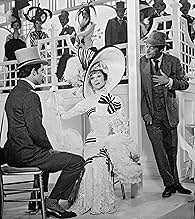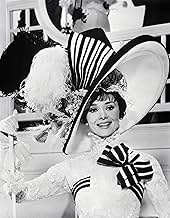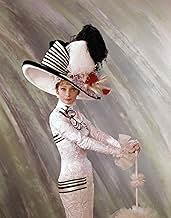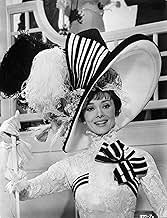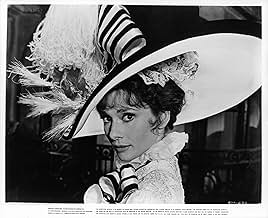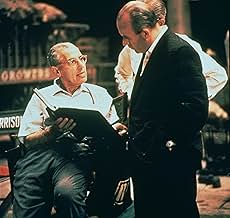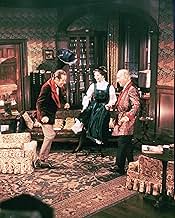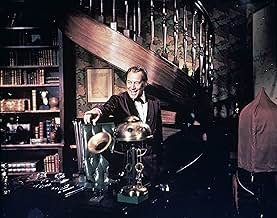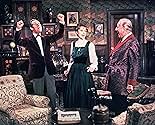1 9 10 के दशक के लंदन में, स्नोबिश ध्वन्यात्मकता प्रोफेसर हेनरी हिगिंस एक दांव से सहमत हैं कि वह कच्चे फूलों की लड़की, एलिजा डूलिटिल को उच्च समाज में प्रस्तुत करने योग्य बना सकते हैं।1 9 10 के दशक के लंदन में, स्नोबिश ध्वन्यात्मकता प्रोफेसर हेनरी हिगिंस एक दांव से सहमत हैं कि वह कच्चे फूलों की लड़की, एलिजा डूलिटिल को उच्च समाज में प्रस्तुत करने योग्य बना सकते हैं।1 9 10 के दशक के लंदन में, स्नोबिश ध्वन्यात्मकता प्रोफेसर हेनरी हिगिंस एक दांव से सहमत हैं कि वह कच्चे फूलों की लड़की, एलिजा डूलिटिल को उच्च समाज में प्रस्तुत करने योग्य बना सकते हैं।
- 8 ऑस्कर जीते
- 26 जीत और कुल 13 नामांकन
David Ahdar
- Ball Guest
- (बिना क्रेडिट के)
- …
Elizabeth Aimers
- Cockney
- (बिना क्रेडिट के)
Helen Albrecht
- Ascot Extra
- (बिना क्रेडिट के)
John Alderson
- Jamie - Doolittle's crony
- (बिना क्रेडिट के)
Mary Alexander
- Cockney
- (बिना क्रेडिट के)
Gertrude Astor
- Cockney
- (बिना क्रेडिट के)
LaWana Backer
- Ad Lib at Church
- (बिना क्रेडिट के)
Walter Bacon
- Ball Guest
- (बिना क्रेडिट के)
फ़ीचर्ड समीक्षाएं
... that being the late 50s to the late 60s. They don't particularly age well .Looking back on them in the context of the 1960s they seem downright anachronistic. . At least this film is not offensive. Gigi, which won Best Picture of 1958, has a young woman's relatives trying to turn her into a prostitute, from which she wisely figures out there is no coming back, while Maurice Chevalier musically ogles little girls from the shelter of the bushes. That one didn't age well in a bunch of ways.
This one has fabulous music, magnificent art design, quite a bit of great dry humor, and perfect casting - except I really wish James Cagney had taken the part of Eliza's father. It would have made a great bookend for his film career. The direction is perfectly on target for late career George Cukor. He won Best Director Oscar for this and didn't make another film for five years.
Rex Harrison certainly deserved his Best Actor Oscar as misanthropic phoneticist Henry Higgins. He is both stern and humorous, his vocals in both song and word are alive and nothing less than perfect. Also, Wilfrid Hyde-White as Pickering adds a great deal to the film, and I appreciate him more on successive viewings.
Thus it is hard to give a film with such great production values less than a 7/10. I have a couple of problems with it. First, it is just too long. Clocking in at two hours and fifty minutes, there is just too much movie for too little story. Pygmalian, starring Leslie Howard, was perfect at ninety minutes, and I actually prefer that film to this one. Second, I don't like the resolution because there isn't one. After all of that squabbling at Higgins' mother's house, after Higgins realizing he has "grown accustomed to her face", the end is just a let down. Had it gone on any longer it would have become Season Four of Moonlighting.
This one has fabulous music, magnificent art design, quite a bit of great dry humor, and perfect casting - except I really wish James Cagney had taken the part of Eliza's father. It would have made a great bookend for his film career. The direction is perfectly on target for late career George Cukor. He won Best Director Oscar for this and didn't make another film for five years.
Rex Harrison certainly deserved his Best Actor Oscar as misanthropic phoneticist Henry Higgins. He is both stern and humorous, his vocals in both song and word are alive and nothing less than perfect. Also, Wilfrid Hyde-White as Pickering adds a great deal to the film, and I appreciate him more on successive viewings.
Thus it is hard to give a film with such great production values less than a 7/10. I have a couple of problems with it. First, it is just too long. Clocking in at two hours and fifty minutes, there is just too much movie for too little story. Pygmalian, starring Leslie Howard, was perfect at ninety minutes, and I actually prefer that film to this one. Second, I don't like the resolution because there isn't one. After all of that squabbling at Higgins' mother's house, after Higgins realizing he has "grown accustomed to her face", the end is just a let down. Had it gone on any longer it would have become Season Four of Moonlighting.
I've seen MY FAIR LADY several times. However, it wasn't until last night that I finally saw the 1938 version of PYGMALION and this was very interesting indeed. It seems that MY FAIR LADY is actually NOT based on the George Bernard Shaw play as much as it's based on the Leslie Howard movie. That's because the dialog (particularly Henry Higgins') is often word-for-word that of the film. Additionally, both films have the same ending--one that is NOT the same as the original play. In the play, the ending was more sad but also much more realistic and consistent with the characters and their growth (or lack thereof in the case of Henry Higgins).
Quality-wise, both films are superb and I enjoyed them immensely. One very obvious difference is that MY FAIR LADY is a musical with lovely songs, so it's a much longer movie. Another is that although Leslie Howard did a very fine job, somehow Rex Harrison came off as grouchier and more entertaining in the lead. Another major difference is that MY FAIR LADY feels more like a comedy and PYGMALION feels much more sad and deeper emotionally. Because it is a bright and colorful musical, the characters in MY FAIR LADY seem a bit less real, but with PYGMALION you are almost brought to tears late in the film.
My recommendation is that you see them both. Both are exquisitely produced and acted and you can't go wrong with either one. I could say more in my review about this film, but considering that there are already a zillion other reviews, I'll end it here.
UPDATE--Only days after posting this review, I got quite a few "not helpfuls". I assume this is from fans who adored this 1964 film. Well, my response is that it can't merit anything more than an 8 because the dialog was directly lifted from the earlier film AND so much of the singing was NOT done by the stars themselves. To me, these are flaws that prevent the film from earning a higher score. And, while I think about it, cannot justify the many 10s I see for the film.
Quality-wise, both films are superb and I enjoyed them immensely. One very obvious difference is that MY FAIR LADY is a musical with lovely songs, so it's a much longer movie. Another is that although Leslie Howard did a very fine job, somehow Rex Harrison came off as grouchier and more entertaining in the lead. Another major difference is that MY FAIR LADY feels more like a comedy and PYGMALION feels much more sad and deeper emotionally. Because it is a bright and colorful musical, the characters in MY FAIR LADY seem a bit less real, but with PYGMALION you are almost brought to tears late in the film.
My recommendation is that you see them both. Both are exquisitely produced and acted and you can't go wrong with either one. I could say more in my review about this film, but considering that there are already a zillion other reviews, I'll end it here.
UPDATE--Only days after posting this review, I got quite a few "not helpfuls". I assume this is from fans who adored this 1964 film. Well, my response is that it can't merit anything more than an 8 because the dialog was directly lifted from the earlier film AND so much of the singing was NOT done by the stars themselves. To me, these are flaws that prevent the film from earning a higher score. And, while I think about it, cannot justify the many 10s I see for the film.
10Hitchcoc
I don't know how much I can add to this. The musical stands alone, as far as I'm concerned, so it puts a lot of pressure on the director, George Cukor, one of the greatest, to complement it. This is a lot to ask. I love this movie. I never got a chance to see the Broadway cast (I was four when it opened), but I have never been disappointed. The production numbers are grand, the byplay between the smug, offensive Higgins and Eliza is precious (my favorite song is "Just You Wait, Henry Higgins"). I've always been intrigued how Freddy never even has a chance (I can't watch those wonderful Sherlock Holmes episodes without imagining the grim visage of Jeremy Brett singing "On the Street Where You Live."). The one thing that made an impression on me, though some may see it as a criticism, is how "clean" everything is. There is no doubt in my mind that Cukor was elevating not only the dialogue but the visual images. It's probably not fair to like a movie because you like looking at an actress, but Audrey Hepburn glows in her Eliza, and I don't care if she is or was a street girl, she is the magical rose on the landscape before she ever meets Higgins. The business about who sings the songs is of no significance to me. This is a movie, not the Broadway show, so the images and sounds are melded and presented. Knowing that Audrey Hepburn has a beautiful voice makes it moot as well. I don't know if she could carry the picture or not--maybe not, but it doesn't concern me. When I first saw Stanley Holloway, there was something about him that grated on me (too many performances on the Ed Sullivan Show). He grated on me as Eliza's father. Now, every time I see this film, I thoroughly enjoy him and I really like the comedic qualities of his song. I love how he and his cronies cavort around London with total disregard for their base roots. I could go on, but I really like this film because it is filled with class: George Bernard Shaw filtered through George Cukor. Not bad!
I have read in a great many places (including the IMDb) that Henry Higgins is a misogynist. It has also been said that the film is a misogynist's fairy tale. Anyone saying this has clearly not watched this film too closely.
First, Higgins is not a misogynist. A misogynist hates women. What Higgins is, in reality, is a misanthrope. A misanthrope basically dislikes and distrusts everyone! Watch the film and you'll notice that Higgins treats everyone with the same disregard-Col. Pickering, Eliza's father, his own mother-everyone receives his rather cynical disdain. Some of the minor characters come off being treated worse than the principals do. It's simply more noticeable with Eliza because it's more frequent, it's newer with Eliza because the other principal characters have known Higgins longer and thus take it in stride. The myth that Higgins is a misogynist is perpetuated by the song, "Why Can't A Woman Be More Like a Man?".
Second, it can hardly be called a misogynist's fairy tale. If that were the case, I doubt Alfred Doolittle would have cause to sing, "Get Me To the Church On Time", as he'd hardly be getting married. His life is just as "ruined" as Eliza's by his encounters with Higgins, just as altered as her life has been.
This is a great musical, a good movie and it was even better as the original play by Shaw. Well worth seeing. Recommended.
First, Higgins is not a misogynist. A misogynist hates women. What Higgins is, in reality, is a misanthrope. A misanthrope basically dislikes and distrusts everyone! Watch the film and you'll notice that Higgins treats everyone with the same disregard-Col. Pickering, Eliza's father, his own mother-everyone receives his rather cynical disdain. Some of the minor characters come off being treated worse than the principals do. It's simply more noticeable with Eliza because it's more frequent, it's newer with Eliza because the other principal characters have known Higgins longer and thus take it in stride. The myth that Higgins is a misogynist is perpetuated by the song, "Why Can't A Woman Be More Like a Man?".
Second, it can hardly be called a misogynist's fairy tale. If that were the case, I doubt Alfred Doolittle would have cause to sing, "Get Me To the Church On Time", as he'd hardly be getting married. His life is just as "ruined" as Eliza's by his encounters with Higgins, just as altered as her life has been.
This is a great musical, a good movie and it was even better as the original play by Shaw. Well worth seeing. Recommended.
8dxia
During the first two hours of this movie, I had thought that it was the greatest musical ever brought to film. It's only during the last hour that it begins to languish and plod. If the first two hours are a solid 10/10, then the last hour is about a 4/10. It brings the average to about 8/10, which is exactly what I gave the movie, but it's fun to think about how great the movie could have been had the producers decided to find a better ending to an otherwise superb story.
It goes to show that film is a tricky medium, and regardless of how great musicals can be, live action simply isn't as interesting when it's recorded. 'My Fair Lady' could have used a bit of trimming, especially in Stanley Holloway's pieces, WITH A BIT OF LUCK and GET ME TO THE CHURCH ON TIME. Although they may have been spectacular to see on stage, movie audiences will yearn to see more about Eliza and wonder why the director spends so much time on her father.
On the brighter side, I believe that I have never seen Audrey Hepburn in a more perfect role. Eliza Doolittle is a lot like she, in their rise from poverty. And watching Audrey is like being invited to see a person shine in their most perfect niche. She isn't gorgeous in a modern sense, but even a decade after her death, her image still carries that immortal appeal. Some critics call it the "it" factor. We don't know what "it" is but we know it's there.
Billy Wilder once said, "God kissed her face, and there she was." For me, I just like her smile, and my smile when I watch her exuberance in one of the defining roles in her career.
It goes to show that film is a tricky medium, and regardless of how great musicals can be, live action simply isn't as interesting when it's recorded. 'My Fair Lady' could have used a bit of trimming, especially in Stanley Holloway's pieces, WITH A BIT OF LUCK and GET ME TO THE CHURCH ON TIME. Although they may have been spectacular to see on stage, movie audiences will yearn to see more about Eliza and wonder why the director spends so much time on her father.
On the brighter side, I believe that I have never seen Audrey Hepburn in a more perfect role. Eliza Doolittle is a lot like she, in their rise from poverty. And watching Audrey is like being invited to see a person shine in their most perfect niche. She isn't gorgeous in a modern sense, but even a decade after her death, her image still carries that immortal appeal. Some critics call it the "it" factor. We don't know what "it" is but we know it's there.
Billy Wilder once said, "God kissed her face, and there she was." For me, I just like her smile, and my smile when I watch her exuberance in one of the defining roles in her career.
Oscars Best Picture Winners, Ranked
Oscars Best Picture Winners, Ranked
See the complete list of Oscars Best Picture winners, ranked by IMDb ratings.
क्या आपको पता है
- ट्रिवियाCostume designer Cecil Beaton created 1,500 costumes for this movie, with the exception of the pearl white gown Hepburn wears to the Embassy Ball, an original Edwardian specimen Beaton found in an antique shop.
- गूफ़When Prof. Higgins sings "An Ordinary Man" he turns on several phonographs, seconds later he turns off one of them but all of the sounds stop.
- भाव
Professor Henry Higgins: There even are places where English completely disappears; in America they haven't used it for years.
- क्रेज़ी क्रेडिटIn the posters, playbills and the original cast album for the stage version of "My Fair Lady", the credits always read "based on Bernard Shaw's 'Pygmalion' ", letting the audience know what play "My Fair Lady" was actually adapted from. The movie credits simply read "from a play by Bernard Shaw".
- इसके अलावा अन्य वर्जनIn the remastered version of the film, some of the scene changes are changed from sudden cuts to wipe outs, as they probably were when the film was released. When CBS Fox released it on video originally, they were changed to sudden cuts.
- कनेक्शनFeatured in Toast of the Town: एपिसोड #18.17 (1965)
- साउंडट्रैकWhy Can't the English?
(1956) (uncredited)
Music by Frederick Loewe
Lyrics by Alan Jay Lerner
Performed by Rex Harrison, Wilfrid Hyde-White, and Audrey Hepburn
टॉप पसंद
रेटिंग देने के लिए साइन-इन करें और वैयक्तिकृत सुझावों के लिए वॉचलिस्ट करें
विवरण
- रिलीज़ की तारीख़
- कंट्री ऑफ़ ओरिजिन
- आधिकारिक साइट
- भाषा
- इस रूप में भी जाना जाता है
- Mi bella dama
- फ़िल्माने की जगहें
- उत्पादन कंपनी
- IMDbPro पर और कंपनी क्रेडिट देखें
बॉक्स ऑफ़िस
- बजट
- $1,70,00,000(अनुमानित)
- US और कनाडा में सकल
- $7,25,60,711
- US और कनाडा में पहले सप्ताह में कुल कमाई
- $3,54,764
- 17 फ़र॰ 2019
- दुनिया भर में सकल
- $7,26,85,970
- चलने की अवधि2 घंटे 50 मिनट
- रंग
- ध्वनि मिश्रण
- पक्ष अनुपात
- 2.20 : 1
इस पेज में योगदान दें
किसी बदलाव का सुझाव दें या अनुपलब्ध कॉन्टेंट जोड़ें







